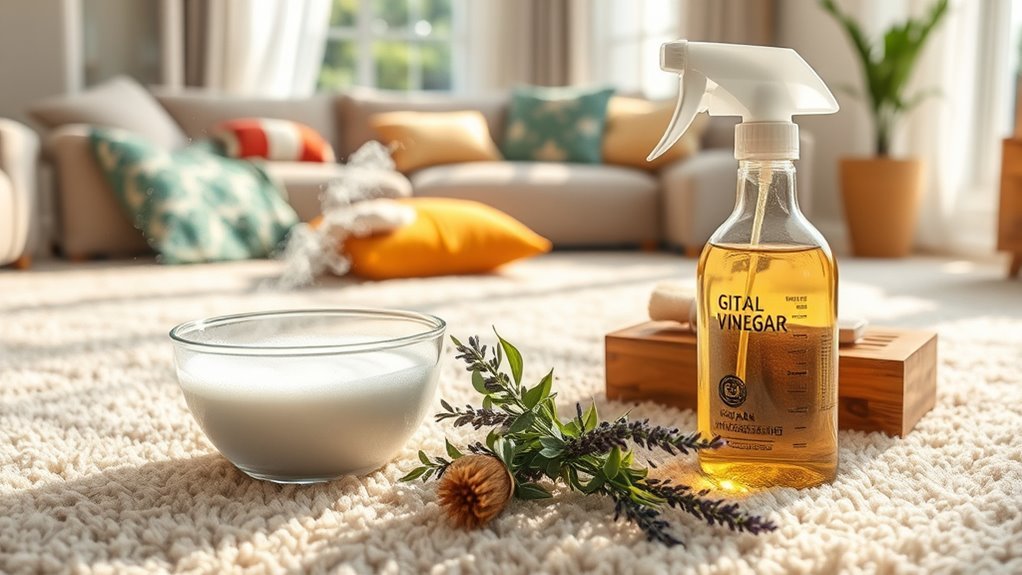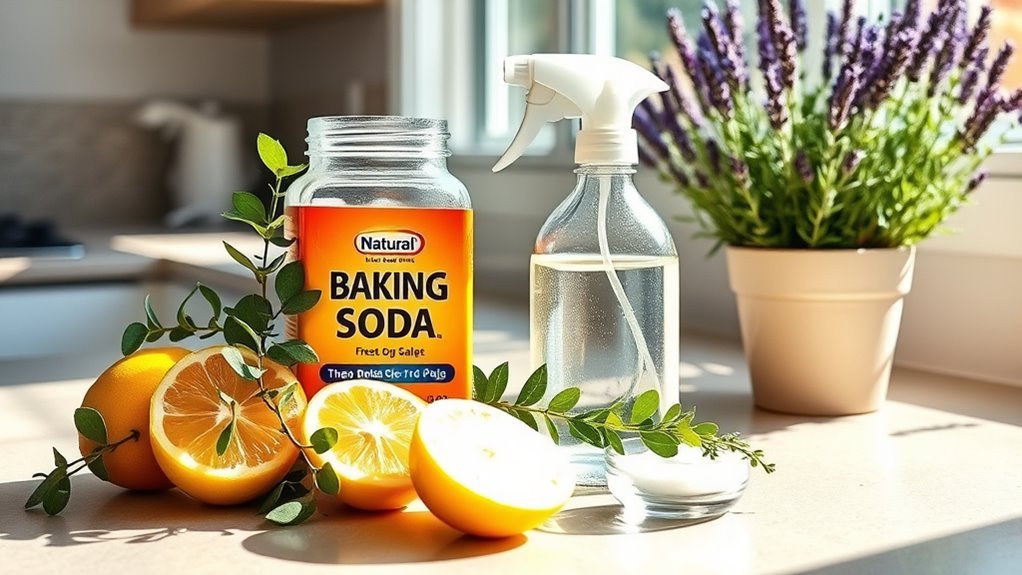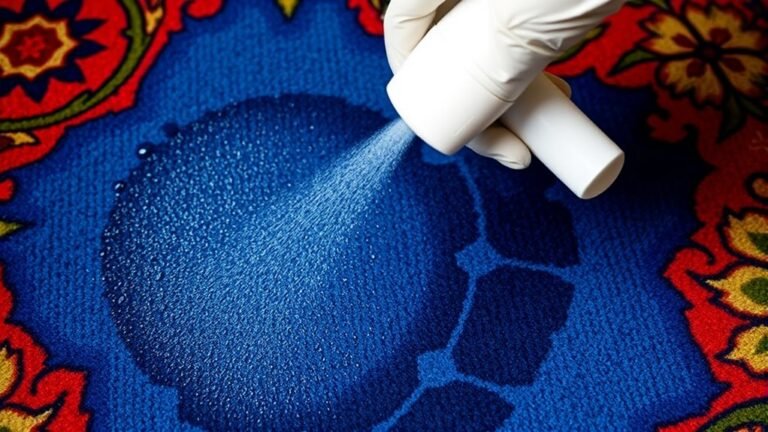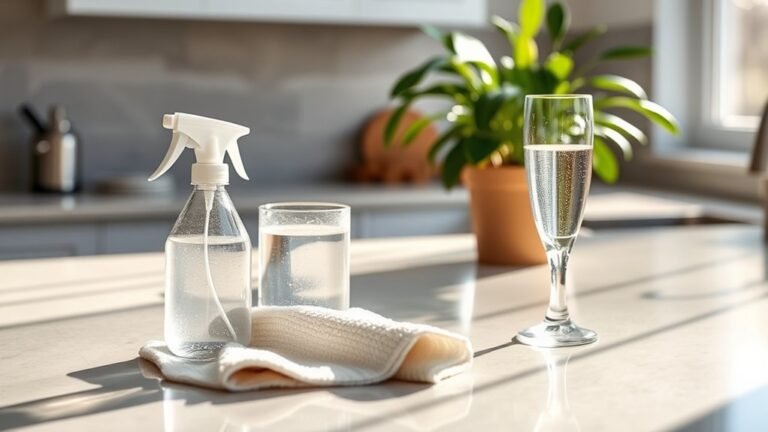Natural Cleaning Hacks for Your Allergens
You can tackle allergens naturally by using vinegar sprays to disrupt dust mites and baking soda to absorb pet dander and odors. Essential oils like eucalyptus and peppermint clear airways, while natural carpet cleaning with steam removes dirt without harsh chemicals. Activated charcoal bags work great as homemade air purifiers, absorbing unwanted particles. Simple dusting with microfiber cloths also reduces airborne allergens. There are plenty more easy, effective ways to create a fresher, healthier home atmosphere.
Using Vinegar Solutions to Eliminate Dust Mites

Although dust mites are microscopic and hard to see, they can cause major allergy problems. You don’t have to feel trapped by them, though. Vinegar solutions offer a natural, effective way to tackle dust mite elimination without harsh chemicals. Simply mix equal parts white vinegar and water in a spray bottle and apply it to your bedding, upholstery, and curtains. The acidity disrupts dust mites’ environment, helping to reduce their numbers considerably. You can freely refresh your home without worrying about allergen buildup or toxic residues. Regular use of vinegar solutions empowers you to reclaim your living space and breathe easier. This simple hack aligns perfectly with your desire for a clean, allergen-free environment—naturally and responsibly.
Baking Soda for Absorbing Pet Dander and Odors
When you want to keep your home fresh and reduce pet allergens, baking soda is a simple solution you can count on. It naturally absorbs pet dander and neutralizes odors without harsh chemicals, giving you freedom from allergy triggers. Just sprinkle baking soda on carpets, furniture, or pet bedding, let it sit for 15 minutes, then vacuum. This quick step traps dander and refreshes your space effortlessly.
| Area | How Baking Soda Helps |
|---|---|
| Carpets | Absorbs embedded pet dander |
| Upholstery | Neutralizes lingering odors |
| Pet Bedding | Reduces allergen buildup |
| Air | Freshens without synthetic scents |
Using baking soda regularly keeps your home cleaner and your air clearer, so you can breathe easy and live freely.
Essential Oils That Combat Airborne Allergens

You can use essential oils like eucalyptus, lavender, and tea tree to help reduce airborne allergens naturally. These oils work by purifying the air and can be added to diffusers or cleaning solutions for added effect. Just be sure to follow safe usage tips to avoid irritation or allergic reactions.
Top Allergy-Fighting Oils
Several essential oils have proven effective at reducing airborne allergens and easing allergy symptoms. When you want to reclaim your space and breathe freely, turning to these oils can be a game-changer. You can use them individually or create oil blends to maximize their benefits. Here are the top allergy-fighting oils you should consider:
- Eucalyptus: Clears nasal passages and soothes irritation.
- Lavender: Calms inflammation and promotes relaxation.
- Peppermint: Opens airways and reduces congestion.
- Tea Tree: Naturally antibacterial and antifungal.
- Lemon: Freshens air and supports immune response.
How Oils Purify Air
Essential oils work by releasing natural compounds that bind to and neutralize airborne allergens, making the air you breathe cleaner and easier on your respiratory system. Thanks to their unique oil properties, essential oils like eucalyptus, tea tree, and lavender excel at air purification. When diffused, these oils break down pollen, dust mites, and mold spores, reducing their presence in your environment. You’ll appreciate how these oils not only freshen your space but actively combat irritants, empowering you to enjoy your freedom without constant allergy triggers. Incorporating essential oils into your routine is a natural way to maintain pure air, helping you breathe freely and live comfortably in your home. Their potent air purification qualities make them a smart, chemical-free choice for allergen control.
Safe Usage Tips
To safely enjoy the benefits of oils that combat airborne allergens, it’s important to follow a few key guidelines. You want to maximize their effectiveness while protecting yourself and the environment. Choosing eco friendly alternatives guarantees your cleaning routine supports your freedom and well-being.
- Store oils in a cool, dark place for safe storage and prolonged potency.
- Dilute essential oils properly to avoid skin irritation or respiratory issues.
- Use a diffuser with automatic shutoff to prevent overexposure.
- Keep oils away from pets and children to guarantee household safety.
- Opt for natural, sustainably sourced oils to minimize environmental impact.
Natural Ways to Clean Carpets and Upholstery

Although carpets and upholstery can trap allergens like dust and pet dander, you don’t have to rely on harsh chemicals to keep them clean. You can use carpet steamers to naturally lift dirt and allergens without toxic residue. The hot steam not only cleans but also sanitizes, freeing your space from irritants. For upholstery, grab a good-quality upholstery brush to gently loosen trapped dust and pet hair before vacuuming. This simple step prevents allergens from settling deeper into fibers. Regularly rotating cushions and airing out fabrics also helps reduce allergen buildup. By embracing these natural methods, you maintain a fresh, allergen-free home while keeping chemical exposure to a minimum—giving you the freedom to breathe easy and enjoy your space fully.
Homemade Air Purifiers With Activated Charcoal
Keeping your carpets and upholstery clean is just one part of reducing allergens in your home. To truly breathe freely, consider homemade air purifiers with activated charcoal. This natural solution harnesses activated charcoal benefits, absorbing odors, pollutants, and allergens without chemicals. You can easily create your own homemade air fresheners that keep air crisp and allergen-free.
Try these simple ideas:
- Fill breathable bags with activated charcoal granules.
- Place them in bedrooms, closets, and cars.
- Combine charcoal with dried lavender for a fresh scent.
- Refresh bags by sun-drying every month.
- Use jars with charcoal beneath sinks or near vents.
With these easy steps, you control your environment and enjoy cleaner air naturally—no pricey gadgets or harsh sprays required.
Simple Dusting Techniques With Microfiber Cloths
You’ll find microfiber cloths are great at trapping dust without spreading allergens around. Using the right techniques, like gentle wiping in one direction, helps keep surfaces cleaner longer. Let’s explore how these simple methods can improve your home’s air quality naturally.
Benefits of Microfiber
When you want to reduce allergens effectively, microfiber cloths are a game-changer for dusting. They trap dust and allergens better than traditional cloths, helping you breathe easier and enjoy a cleaner space. Plus, microfiber offers eco friendly alternatives to disposable dusters, meaning you cut down waste while keeping your home fresh.
Here are some microfiber benefits that make them your go-to choice:
- Captures up to 99% of dust and allergens
- Requires little to no cleaning chemicals
- Durable and reusable for long-term use
- Gentle on surfaces, preventing scratches
- Dries quickly, reducing bacteria growth
Choosing microfiber puts you in control of a healthier, freer living space without harming the planet.
Effective Dusting Methods
Microfiber cloths make dusting not only more effective but also quicker and less messy. Instead of relying solely on effective feather dusters, grab a microfiber cloth to trap dust and allergens without scattering them into the air. You’ll find these cloths glide smoothly over surfaces, capturing particles that feather dusters often miss.
To keep your space allergen-free, fold the cloth into sections, dusting one area at a time, then refold to a clean side. Wash and reuse your microfiber cloths to support sustainable cleaning practices, cutting down waste and chemicals. By choosing microfiber over disposable options, you gain freedom from allergens and contribute to a cleaner planet. Simple, efficient dusting with microfiber puts you in control of your environment.
Frequently Asked Questions
Can Natural Cleaning Harm Sensitive Surfaces or Finishes?
Did you know vinegar’s acidic effects can etch surfaces like marble or hardwood? When you’re cleaning, it’s easy to think natural means harmless, but vinegar effects could harm sensitive finishes if left too long. Baking soda applications tend to be gentler, perfect for scrubbing without scratching. So, if you want freedom from harsh chemicals but still want to protect your surfaces, test natural cleaners on a hidden spot first to avoid damage.
How Often Should I Clean to Effectively Reduce Allergens Naturally?
You should focus on cleaning frequency based on allergen hotspots like carpets, bedding, and upholstery. Aim to clean these areas at least once a week to keep allergens at bay without feeling trapped by constant chores. Dust surfaces and vacuum regularly, using natural products to maintain your freedom from harsh chemicals. By staying consistent, you’ll reduce allergens effectively and keep your space fresh without overwhelming your schedule.
Are Natural Cleaning Products Safe for Children and Pets?
Imagine Sarah, who switched to child friendly cleaners made with natural ingredients safety in mind, feeling relieved knowing her toddler’s health isn’t at risk. You can enjoy the freedom of a clean home without harsh chemicals by choosing products with ingredients like vinegar, baking soda, and essential oils. Just remember to check labels and avoid toxic additives. This way, you keep your little ones and pets safe while maintaining a healthy environment.
Can Diet Changes Help Reduce Allergic Reactions at Home?
You might find that dietary modifications can help reduce allergic reactions at home by minimizing your exposure to common allergy triggers through what you eat. By identifying and avoiding foods that worsen your symptoms, you gain more control over your environment and health. This freedom allows you to tailor your diet to support your immune system, potentially easing indoor allergies and making your living space more comfortable and allergen-friendly.
What Are the Best Natural Methods for Mold Allergen Removal?
Imagine your home as a fresh breeze waiting to flow freely—mold removal can make that happen. You’ll want to tackle mold by scrubbing affected areas with a mix of vinegar and water, a natural powerhouse. Adding essential oils like tea tree or eucalyptus not only boosts mold removal but leaves your space smelling clean without harsh chemicals. This approach gives you the freedom to breathe easy, without being trapped by allergens.






